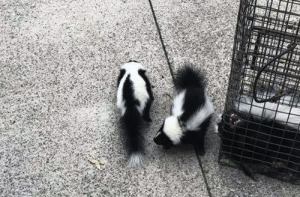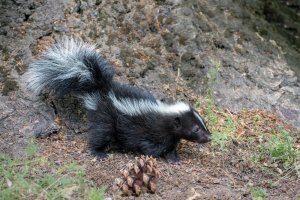What to do if a skunk is not scared of people, acting strange or is aggressive?
Skunks are not everyone’s favorite animal. They have a bad aroma, and they could even spray you with a horrible odor that is difficult to remove. Luckily, skunks do not have an immediate instinct to spray people with their odor. It is merely a defensive mechanism. It’s important to remember that skunks only have a limited amount of spray in their body. If they finish their entire amount in one attack, it will take them around 10 days to completely recharge. This is a lot of time! In the 10 days, the animal is left without any solid defense tactic and is left vulnerable to their predators.
 Knowing this, it is best to leave skunks alone and avoid interaction. People will be most safe from getting sprayed on when they do not trigger the animal. If the skunk is not acting strange or aggressive, another good reason to avoid provoking them is that they probably do not have rabies. Skunks are very susceptible to rabies, which can be extremely dangerous to the animal itself, as well as humans. Rabies can be transmitted via direct contact, such as a bite. Because of that, it is general good practice to keep yourself and your pets away from skunks if you see them during the daytime. Skunks who are infected with this disease usually lose the fear of humans and become a lot more aggressive. It is also likely that they are wandering more during the daytime. So, if you see a skunk that is not showing these signs, it probably means they will not have the urge to attack and spray you.
Knowing this, it is best to leave skunks alone and avoid interaction. People will be most safe from getting sprayed on when they do not trigger the animal. If the skunk is not acting strange or aggressive, another good reason to avoid provoking them is that they probably do not have rabies. Skunks are very susceptible to rabies, which can be extremely dangerous to the animal itself, as well as humans. Rabies can be transmitted via direct contact, such as a bite. Because of that, it is general good practice to keep yourself and your pets away from skunks if you see them during the daytime. Skunks who are infected with this disease usually lose the fear of humans and become a lot more aggressive. It is also likely that they are wandering more during the daytime. So, if you see a skunk that is not showing these signs, it probably means they will not have the urge to attack and spray you.
Skunks are naturally introverted animals – they do not like human attention, so they will not seek this type of interaction. Instead, they rather keep to themselves and find food without anyone getting in harm’s way. Furthermore, skunks are nocturnal creatures. They will most likely be looking for food or exposing themselves in the open at night when it is dark.
Nevertheless, you might see a skunk or smell the aroma of one. So, here are some tips to do when you see a skunk and want it to run away:
- Flip on the porch light
- Make noise (ie. clap hands, whistle, slam door)
All of these distractions can alert skunks that someone is nearby, causing them to run away and enact their survival instinct. Remember that they do not want to hurt you or use their spray, so leaving them alone or alerting them of your presence is your best option. Furthermore, skunks do not have great physical strengths or defensive mechanisms beyond their spray. As an animal species, they are slow, have poor eyesight, and cannot climb elevated surfaces. This means the odds are stacked in your favor, and if you take the right precautions, you can easily avoid being sprayed.
 If you are ever in a situation that you think a skunk might spray you, look for some warning signs. These might include:
If you are ever in a situation that you think a skunk might spray you, look for some warning signs. These might include:
- A raised tail that he shakes
- Stomping of feet
- A skunk may begin to turn their back towards you to indicate that he will spray soon.
If you do give skunks a reason to be frightened, these actions are very unlikely. Regardless, it is important to remember these signals if you ever are encountered with such a situation, so you know how to respond accordingly. Overall, skunks can be harmless. Spraying humans really is their last option – they rather use it for more dire circumstances, such as defending themselves against a predator. If you remember these tips and understand the behavior of skunks, you will be safe and odor-free!
